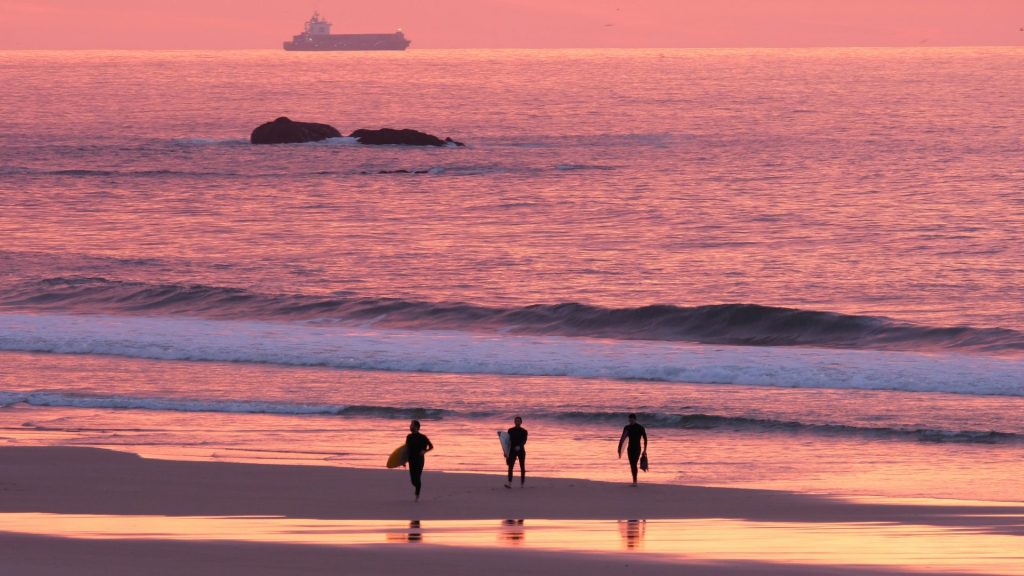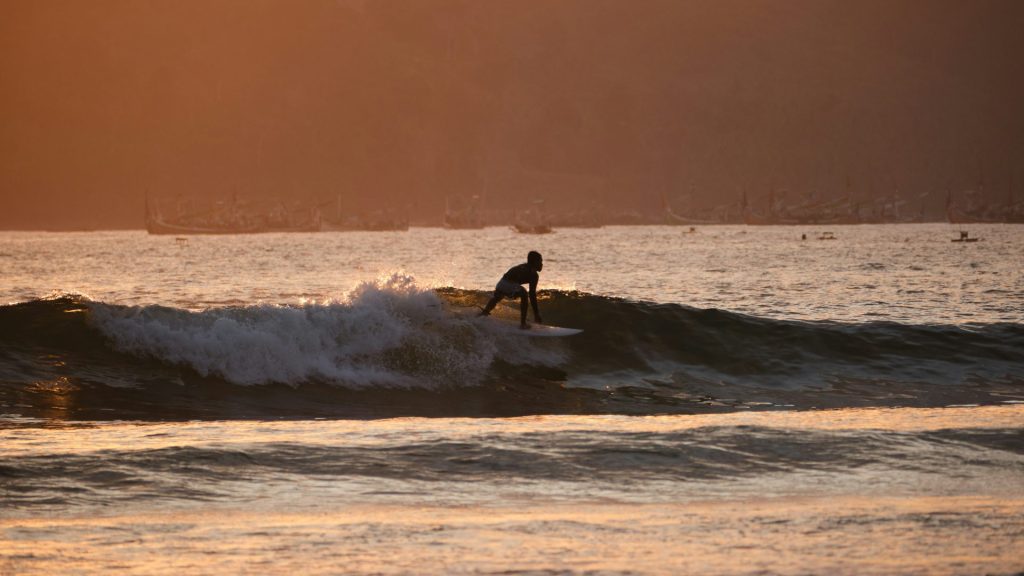How Hard Is Surfing Really?

How hard is surfing? Learning to surf like any sport, is hard to master.
With regular surf sessions, a realistic time frame to learn is 6 weeks. Each individual will learn at different speeds due to physical, psychological and environmental differences.
At 13 years old I learned to surf at Godrevy Beach, Cornwall with a close friend's dad who was an experienced longboarder and had been surfing that spot since he was a boy.
Like anything worthwhile, it wasn't easy. Especially during the time in the white wash which felt like an eternity!
But once the 6 weeks school holiday was over, I could comfortably surf the lineup.
I will never forget my first ever wave from the lineup. Going down the face, hands in the air cheering to my buddy, if only you could bottle that feeling!
How Long Does It Take to Learn to Surf?
Learning to surf, like any sport, varies from person to person.
On average, it takes around 6 weeks of regular surf sessions to become comfortable in the water and catch your own waves.
However, individual factors such as physical fitness, psychological readiness, and environmental conditions can influence the learning curve.
While some may progress more quickly, others may take longer to develop their skills.
Remember, learning to surf is a journey, and even experienced surfers continue to refine their techniques over time.
How Hard Is Surfing?
Learning how to surf can be both challenging and rewarding.
Initially, beginners may find it difficult to balance on the board and catch waves effectively.
The process involves understanding ocean dynamics, timing waves, and mastering various surfing techniques.
Additionally, paddling out through breaking waves and navigating the lineup can be physically demanding.
However, with patience, practice, and guidance from experienced surfers or instructors, anyone can learn to surf and experience the thrill of riding waves.
How Fast Can You Learn How to Surf?
The speed at which you learn to surf depends on several factors, including your dedication, previous experience in water sports, and natural ability.
While some individuals may pick up surfing basics relatively quickly, others may require more time to feel comfortable on the board.

10 Things You Should Know Before You Learn To Surf
Before even getting in the water you can begin to learn how to surf, researching how hard is surfing is a good start. Reading up on surf etiquette, watching videos on how to read waves and getting your fitness up will all help!
1. Determination & Patience
Surfing is tough, but staying determined helps you push through falls and setbacks. Patience is key for learning and choosing the right waves.
2. Fitness & Age
Being fit helps you handle the waves better and learn faster. Younger surfers often catch on quicker because they're more agile and have greater flexibility in their hips.
3. The Correct Surfboard
Picking the right board is crucial for your skill level and the waves you'll ride. Beginners are advised to ride foam longboards, perfect for them to ,aster their popup before progressing onto shorter hoards and bigger swell.
4. You Will Wipe Out (Enjoy It!)
You're going to fall a bunch. Being okay with that and getting back up is part of getting better. Some wipeouts can be fun, whereas others can be gnarly but its all part of surfing.
5. Learn The Technique Before
Take time to learn the basics before you start. It makes surfing more fun and safer. You learn the correct technique to paddle on the beach for example.
6. Reading Waves is a Skill
Understanding the waves helps you catch more and better waves. Knowing when to go and when not to go soon becomes a feeling, however when starting out your using a lot of guess work and trial error learning every second.
7. Repetition
Practice makes perfect. The more you surf, the better you get it's as simple as that. One surf lesson on a family holiday won't cut it. This will determine your opinion on "how hard is surfing to learn".
8. Timing Is Everything (The Sweet Spot)
Knowing when to catch a wave makes surfing easier and more enjoyable.
However some waves you will go for and be too early just missing the drop. Others you will go to early and nosedive to the bottom of the ocean!
9. The Correct Conditions & Surf Spots
Pick spots that match your skill level. It makes learning easier and safer. Swell 2-3ft is perfect to learn in. I learned in a bit bigger than, but its never going to be perfect. Just do the best with the cards you are dealt.
10. Surfer Etiquette
Respecting others in the water makes surfing more enjoyable for everyone.
Make sure you read up on surf etiquette and don't drop in on anyone in the lineup.

Things You Need To Learn When Surfing
- Waxing Your Board: Waxing your surfboard helps provide traction for your feet while riding waves.
- Attaching the Leash: Attaching the leash ensures your board stays close if you fall off.
- Catching Whitewater Waves: Catching whitewater waves helps beginners practise standing up on the board.
- Paddling Out: Paddling out requires efficient techniques to navigate through breaking waves.
- Sitting Out in the Lineup: Sitting out in the lineup involves positioning yourself correctly to catch incoming waves.
- Leaving the Ocean: Leaving the ocean safely entails understanding rip currents and wave patterns.
- Duck Diving Waves: Duck diving waves is a skill to get under breaking waves while paddling out.
- Saving Energy: Saving energy involves conserving your strength for longer surf sessions.
- How To Bail: Knowing how to bail safely minimises the risk of injury when falling off the board.
- Enjoying The Journey: Enjoying the journey emphasises embracing the challenges and joys of surfing, from wipeouts to triumphs.
Is Surfing Fun Once You Learn?
Yes surfing is fun, there is no sport quite like it!
It's the reason millions of people around the world flock to the beach every day. The feeling is like no other.
Surfing itself is one of the most rewarding sports in the world.
Not only do you get to float on water, you also gain a new group of friends, stay physically fit and keep your mental health in check!
“Surfing is one of the most difficult sports in the world” - True or False?
This is definitely up for debate, however I believe there more difficult sports to learn especially reaction sports.
But people still aks how hard is surfing?
The learning curve in surfing is very dramatic due to entering a brand new environment in the ocean, this adds to the challenge. But the action of surfing once mastered is very simple and can be done by the majority of the population.
To be a good" surfer is a whole different kettle of fish!
This is extremely hard to achieve.
Especially big wave surfers who dedicate their lives to the sport, it's no joke. These guys and girls are some of the most high performing humans on the planet!
Summing It Up: What To Do Now
Now you know the answer to how hard is surfing to do successfully, it's time ot decide if its the right sport for you! (it is!)
The Golden Rule: Only surf in small waves when learning and ensure you have someone with you to guide in the right direction.
Read up on surf etiquette before entering the water it will save you getting into any confrontation with the local surfers!
Frequently Asked Questions
Is surfing the most difficult sport?
Surfing's difficulty varies, but whether it's the most challenging sport is subjective and depends on individual experiences.
How quickly can I learn to surf?
The learning pace varies, influenced by factors like dedication, prior experience, and consistent practice opportunities.
What sport is the hardest physically?
Sports like boxing, gymnastics, surfing and marathon running are often considered among the most physically demanding.
How hard is surfing to do?
Surfing can pose challenges initially, but with practice and determination, many find it enjoyable and rewarding.
Can you learn to surf in 3 days?
While basic skills can be acquired in three days of intensive lessons, becoming proficient usually requires more time and practice.
What is the closest sport to surfing?
Snowboarding and skateboarding share similarities with surfing in terms of balance, board control, and riding techniques, making them close relatives.


